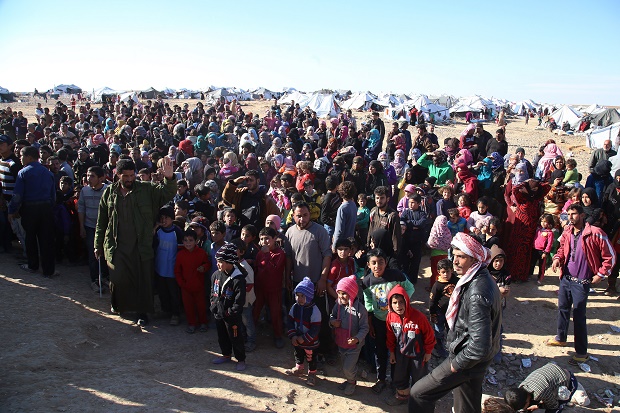DAMASCUS, Syria—Tens of thousands of Syrians fled their homes on Thursday as regime troops pressed a major Russian-backed offensive around second city Aleppo, as Moscow and Ankara traded barbs over the escalating crisis.
READ: US, France accuse Assad of scuppering Syria peace talks
Turkey’s Prime Minister Ahmet Davutoglu, speaking at a conference in London where donors pledged more than $10 billion in aid for Syrians, said up to 70,000 people were headed towards his country to escape the fighting.
Both Davutoglu and activists said 300,000 people were isolated in Aleppo after the rebels’ main supply route from Turkey was severed by regime forces backed by Russian warplanes.
“The situation in the north countryside of Aleppo is catastrophic,” said Maamoun al-Khateeb, an activist and journalist from nearby Marea village.
“Civilians are now besieged from three sides and have just one road to the Turkish territories,” he said, explaining that regime forces threatened from the south, Islamic State of Iraq and Syria (ISIS) group jihadists from the east and Kurdish fighters from the west.
As the offensive raged, diplomatic tensions were also rising, with Moscow accusing opposition supporter Ankara of preparing to invade Syria, saying it had spotted troops and military equipment on the border.
READ: US accuses Damascus, Moscow of seeking military solution in Syria
Hours earlier Davutoglu had accused supporters of President Bashar al-Assad, which include Russia, of “committing the same war crimes” as the regime.
The push by government forces has been backed by Russian bombings, including strikes that killed at least 21 civilians, including three children, on Thursday, according to Britain-based monitor the Syrian Observatory for Human Rights.
More than 260,000 people have been killed in Syria’s conflict and more than half the country’s population have been forced from their homes, including more than four million who fled abroad to neighbours Jordan, Lebanon and Turkey.
Western nations have accused Syria’s regime of torpedoing peace talks this week with its military offensive, and Washington demanded Moscow halt its campaign in support of Assad.
In London for the donors conference, US Secretary of State John Kerry said he had warned Moscow to stop targeting the Syrian opposition, in a “robust” phone call with Russian counterpart Sergei Lavrov.
‘Back to the table’
Negotiations to end Syria’s five-year war barely got off the ground and on Wednesday were suspended until February 25.
“The coming days should be used to get back to the table, not to secure more gains on the battlefield,” UN Secretary-General Ban Ki-moon told the donor conference.
The UN Security Council said it would meet on Friday for consultations with envoy Staffan de Mistura.
Top diplomats from countries involved in trying to resolve the conflict are also set to meet again on February 11, but tensions inside the group remain strong.
Meanwhile, Saudi Arabia, which backs opponents of the regime, said it was ready to join any ground operation in the US-led coalition against ISIS in Syria.
“If there is any willingness in the coalition to go in the ground operation, we will contribute positively in that,” Brigadier General Ahmed al-Assiri told AFP.
Aleppo city, Syria’s former economic powerhouse, has been divided between opposition control in the east and regime control in the west since mid-2012.
The rebels’ main supply line to Turkey was severed on Wednesday when regime troops broke an opposition siege of two Shiite towns, Nubol and Zahraa, on the route to the border.
Regime forces entered the two towns on Thursday to the cheers of residents, who chanted pro-government slogans and showered the fighters with rice.
But elsewhere in the region the advance prompted tens of thousands to flee for fear of being caught up in the fighting.
Davutoglu said 60,000 to 70,000 people were “moving towards Turkey” and 10,000 were “waiting at the door” on the border because of air strikes and attacks around Aleppo.
The Observatory said nearly 40,000 people in Aleppo province had fled their homes, with many massing at the border.
A high-ranking Syrian government official described the Aleppo advances as important, but said the regime had even more ambitious goals.
“The next objectives are to close the borders with Turkey to prevent the arrival of troops and weapons, then taking Aleppo province, then Idlib province, and finally Idlib city,” he told AFP.
